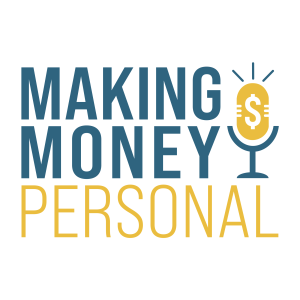Episodes

Thursday May 16, 2024
Episode 69: The Importance of Assessing Your Financial Plan | Brian Luce
Thursday May 16, 2024
Thursday May 16, 2024
Financial Planning can be intimidating and often confusing for anyone new to putting together a sound financial strategy. But if you want to be successful with your money, it's important to know your financials and even better to have someone available to support you along your journey.
In this episode, we're chatting with Brian Luce from Triangle Financial Group about what a financial plan is, why it's important to have one, and how his team can help you get started.
Links:
Check out Triangle Financial Group resources at trianglefinancialgroup.com
Contact Brian and his team to get started building your financial plan
Try out the Financial Wellness Assessment
Check out TCU University for more financial education tips and resources!
Follow us on Facebook, Instagram and Twitter!
Learn more about Triangle Credit Union

Tuesday May 14, 2024
How Missed Payments Impact Your Credit Score - Money Tip Tuesday
Tuesday May 14, 2024
Tuesday May 14, 2024
Your credit score is essential. It drives your financial opportunities and impacts how good a rate you’ll get for mortgages, personal loans, and auto loans.
Most of us know about our credit score and are likely looking for ways to improve it, so knowing what impacts it the most is the first step in improving our credit outlook.
Links:
View the Investopedia article
Get started with LoanPay and make a payment today!
Watch these video tutorials on
Setting Up Your LoanPay Account
Setting up AutoPay
Making a One Time Payment
Check out TCU University for more financial education tips and resources!
Follow us on Facebook, Instagram and Twitter!
Learn more about Triangle Credit Union
Transcript:
Welcome to Money Tip Tuesday from the Making Money Personal podcast.
If you’ve followed our previous episodes or read any of our articles, you probably already know that a credit score is determined by several different factors.
In order to keep your score in good shape, it’s critical to understand the different factors contributing to that number and how to maintain them properly.
A lot of this maintenance is our responsibility, so when we decide to work with a lender to borrow money, we should make sure our credit scores have been properly attended to.
According to Investopedia, all three bureaus, Experian, Equifax, and TransUnion, factor the following weights into their credit scores.
The two lowest percentages are each weighted at 10% and are 1) any new credit you get and 2) the types of credit you have or credit mix.
Then there’s the length of your credit history, weighted at 15%.
The total amount owed is a higher weighted factor at 30%. Finally, your payment history comes in as the highest factor at 35%.
So, if you want to properly nurture your credit score, you need to pay attention to each of these categories and keep special note of the higher-weighted ones. Most importantly, you need to ensure you make your payments on time.
Have you or someone you know missed payments in the past? If so, that likely impacted the credit score.
I’ve missed a few payments before because I got busy in life, and my distracted brain completely forgot that a payment was coming due. Then, the due date came and went before I realized that I had forgotten to pay. This is a big problem and something we need to be on guard against. Something as simple as not paying attention to the calendar can cause this problem.
If you’ve had this happen in your own experience, or you know someone it’s impacted, it’s important to note how it can affect you. And the real danger here is the price you pay for it. Not only do you get charged late fees, but it gets reported back to the bureaus and factored into your credit score.
If you find you’re struggling to remember to make your payments, there is something you can do about it to make sure it doesn’t happen again. Take the time to set up automatic payments. Your financial institution likely provides a tool within mobile or online banking to schedule recurring loan payments. For example, Triangle Credit Union allows members to do so through the LoanPay platform. This tool lets people plan their loan payments in advance, customize the payment amount, set a payment frequency, and even set the duration they want the payments to run.
If you’re determined to not let your score suffer from hits due to missed payments, then take a few minutes and set up autopay for payment peace of mind and a healthy credit score.
If there are any other tips or topics you’d like us to cover, let us know at tcupodcast@trianglecu.org. Like and follow our Making Money Personal FB and IG page, and look for our sponsor, Triangle Credit Union, on social media to share your thoughts.
Thanks for listening to today’s Money Tip Tuesday. Check out our other tips and episodes on the Making Money Personal podcast.

Tuesday May 07, 2024
Tips to Avoid Doom Spending and Safeguard Your Wallet - Money Tip Tuesday
Tuesday May 07, 2024
Tuesday May 07, 2024
Are you often worried or discouraged about economic factors or current events? Not surprisingly, current events can substantially impact how we behave with money.
Many people react to news or events with coping mechanisms, one of which involves overspending. Fortunately, there are ways to keep current events from impacting your mindset and, ultimately, your money.
Links:
Check out TCU University for more financial education tips and resources!
Follow us on Facebook, Instagram and Twitter!
Learn more about Triangle Credit Union
Transcript:
Welcome to Money Tip Tuesday from the Making Money Personal podcast.
If you've heard of Doom Scrolling, the term describes when people mindlessly scroll through newsfeeds and social media feeds, glued to negative headlines. It tends to evoke feelings of anxiety or depression.
Another term has popped up recently describing a similar phenomenon called Doom Spending. This term describes a person's tendency to mindlessly spend money to cope with stress or anxiety, particularly stress or anxiety due to current events or economic factors. It's a type of emotional spending or even retail therapy. And because so many shopping apps make it easy to scroll through thousands of items, many people may run to those apps to scroll through products and shop for all kinds of things to offset negative feelings.
Doom Spending poses many problems for those who fall into it. It's dangerous and can wreak havoc on your finances by derailing your financial plan and interfering with your ability to establish beneficial money habits.
It can also cause you to make financial decisions you may regret in the future, as well as missing out on wealth-building opportunities as they arise.
If you're susceptible to Doom Spending, you may find yourself shopping through an endless scroll and blowing a bunch of money to help you feel better.
Remember that your feelings start with what you choose to focus on. Don't focus on all the negative. Remember that headlines tend to be sensationalized and promote what will most likely get a reaction out of you. Scientifically, headlines with negative messaging get more engagement than those with positive messaging.
If you're engaging in doom spending to cope with stress, here are a few things you can do to guard against it.
Change your routine. If you're scrolling most often at a particular time of day, say late at night before bed or on your way home from work, you might find that this is the time you feel more likely to spend. Turn off the media and take a break from your phone. Keep it away from the nightstand, or swap it with a book instead. If you spend too much time on the couch with your phone or in front of the TV, try taking a walk instead to get away from the devices.
Develop a method to stay on top of spending. Take charge of your money. Set a budget, make a list on paper or your phone, or use a money management app to track your weekly spending. Knowing how much you're spending is the first step to taking charge of your finances. If you don't know it, you can't control it, and you won't succeed at managing it properly.
Put your mental energy into reaching financial milestones. Part of the reason people spend money mindlessly is to feel better. But you can also get those feelings when you achieve milestones. Set a savings goal for yourself, like saving your first $1,000 in an account, having a certain amount of money in a retirement account, or paying off some debt. Focus on building a solid financial position rather than slipping into doom spending.
Budget some of that money for positive purposes. Cut down on impulsive behavior and mindless shopping by planning to spend your money on beneficial things. If you're feeling anxious and emotionally worn, then put some of that money into things that will help bring you mental rest. Instead of spending it on the accumulation of stuff, set some money aside for a unique experience or leisure event that will help you refresh mentally and take some of the emotional burden off your mind.
Make it more of a challenge to spend money. Creating barriers to spending might be needed to stop mindless spending. Saved payment information, shopping apps on phones, and notifications are all designed to tempt you to spend and to spend quickly. Setting up a barrier to spending is an easy way to reduce doom spending. Barriers interfere with the purchasing process, making it more challenging to spend. Remove saved payment information in checkouts, turn off shopping notifications, and even uninstall shopping apps from your phone if they're tempting you too much.
Letting external circumstances drive your money habits can be unproductive and dangerous to your financial health. We hope some of these tips will help you avoid doom spending and empower you to succeed financially.
If you are facing a financial crisis due to an economic issue, seek advice from a financial professional who can help you adjust according to the situation. Their expertise and experience will provide proper guidance to navigate many situations.
If there are any other tips or topics you'd like us to cover, let us know at tcupodcast@trianglecu.org, and don't forget to like and follow our Making Money Personal FB page and look for our sponsor, Triangle Credit Union, on Instagram and LinkedIn to share your thoughts.
Thanks for listening to today's Money Tip Tuesday. Check out our other tips and episodes on the Making Money Personal podcast.
Have a great day!

Tuesday Apr 30, 2024
Drive Confidently with MRC and GAP Vehicle Coverage - Money Tip Tuesday
Tuesday Apr 30, 2024
Tuesday Apr 30, 2024
Buying a vehicle is one of the most significant purchases you'll make, so ensuring it's protected is very important.
Guaranteed Asset Protection coverage, or GAP, and Mechanical Repair Coverage, also referred to as MRC, are essential in protecting your new vehicle. Keep listening to learn more about these coverages and how to make them work for you.
Links:
Learn more about the benefits of GAP coverage and MRC
Check out TCU University for more financial education tips and resources!
Follow us on Facebook, Instagram and Twitter!
Learn more about Triangle Credit Union
Transcript:
Welcome to Money Tip Tuesday from the Making Money Personal podcast.
First, let's take a look at GAP coverage. Did you know a newly purchased vehicle depreciates the second you drive it off the dealer's lot? Within the first year, most cars will lose up to 20% of their value. If your vehicle is totaled in an accident or stolen and not recovered, you could end up owing more than the vehicle is worth.
GAP coverage is designed to reduce or eliminate the difference between the insurance settlement and the loan balance. This protection can save you tons of money from sudden out-of-pocket expenses. In comparison, standard auto insurance will only pay up to the value of your vehicle. GAP coverage will protect you from the difference.
So, how do you obtain GAP coverage? There are several options. First, you can sign up for GAP when you purchase your new vehicle with an auto loan. Triangle Credit Union offers GAP coverage as an additional option to their auto loans. Second, your auto insurance may also offer GAP coverage for your vehicle.
Now, let's look at Mechanical Repair Coverage, or MRC. This coverage can help limit unexpected, covered repairs as your vehicle ages, potentially saving you thousands of dollars in repairs. MRC includes many benefits, such as car rental reimbursement, 24-hour roadside assistance, and car key replacements. It will even cover travel expense reimbursements when a covered breakdown occurs 100 miles or more from your home and your vehicle is held overnight at a repair facility.
With vehicles already being a significant expense, it makes sense to be fully covered in case something goes wrong. GAP coverage and MRC can save you thousands of dollars, so if you're thinking about buying a car, you might want to consider getting one or both. Luckily, they're available as add-on options for your new or existing auto loan from Triangle Credit Union!
One final note. GAP and MRC are also available to purchase out of pocket for those who don’t have a Triangle auto loan or don’t want it as a loan add-on. If you want this valuable coverage for an existing loan, stop by your nearest branch to get started!
If there are any other tips or topics you'd like us to cover, let us know at tcupodcast@trianglecu.org. Also, remember to like and follow our Making Money Personal Facebook and Instagram to share your thoughts. Finally, remember to look for our sponsor, Triangle Credit Union, on Facebook and LinkedIn.
Thanks for listening to today's Money Tip Tuesday. Check out our other tips and episodes on the Making Money Personal podcast.

Thursday Apr 25, 2024
Episode 68: Money Matters: Embracing Financial Education for Any Age
Thursday Apr 25, 2024
Thursday Apr 25, 2024
When it comes to money, there are so many ways to learn vital lessons and techniques that help us make wiser financial decisions.
Whether you're someone who likes to learn about financial topics for fun or tends to learn from experience, becoming financially literate is a goal most of us should strive for. In this episode, we're discussing financial literacy and its crucial role in our lives and society.
Links:
Financial literacy stats sourced from this article.
Test your knowledge with the Investopedia Financial Literacy Quiz!
Explore and download our When Dollars Make Sense workbook for kids!
Check out TCU University for more financial education tips and resources!
Follow us on Facebook, Instagram and Twitter!
Learn more about Triangle Credit Union
Financial Literacy Quiz answers:
Which of these is NOT part of determining your credit score? Marital Status
When you invest in an employer's traditional 401(k) retirement savings plan, your contributions are taxed when you withdraw them during retirement.
What causes inflation? Increases in wages, price of raw materials, taxes, and/or a decrease in productivity
Which of these is NOT a stock market index? New York Stock Exchange
What Does Annual Percentage Rate (APR) Mean? APR is the rate you pay in interest on money borrowed.
True or false: Annual Percentage Yield (APY) is the interest you earn over the course of a full year on money deposited. True
Which home loan allows first-time homebuyers to put down just 3.5%? Federal Housing Administration (FHA) mortgage

Tuesday Apr 23, 2024
Navigating Car Purchases: The Role of Down Payments - Money Tip Tuesday
Tuesday Apr 23, 2024
Tuesday Apr 23, 2024
Car buying is a fun and exciting journey. You have a lot of options to explore and decisions to make.
Of all the many factors considered when purchasing a new or used car, determining how much to put down is an important decision that affects all aspects of the financing process.
Links:
Check out Triangle's competitive auto rates for new purchase or refinance.
Check out TCU University for more financial education tips and resources!
Follow us on Facebook, Instagram and Twitter!
Learn more about Triangle Credit Union
Transcript:
Welcome to Money Tip Tuesday from the Making Money Personal podcast.
When it comes to purchasing a car, one of the critical decisions you’ll face is how much to put down as a downpayment. Whether you’re eyeing a brand-new model or considering a reliable used car, understanding the significance of down payments can help you make an informed choice. In this tip, we’ll explore why down payments matter and provide practical tips for finding the right balance.
Why is the amount of your down payment important?
First, it can lower your interest rates: A substantial down payment can significantly impact the interest rate on your auto loan. Lenders view a larger down payment as a sign of financial stability and are more likely to offer you a favorable rate. Lower interest rates mean less money paid over the life of the loan.
Second, it can reduce your monthly payments: By putting more money down upfront, you decrease the amount you need to finance. As a result, your monthly payments become more manageable. This financial breathing room can be especially helpful if you’re on a tight budget. Third, it helps you avoid negative equity: Negative equity occurs when you owe more on your car loan than the vehicle is worth. A sizable down payment helps prevent this situation. Since cars depreciate rapidly, starting with equity can protect you from being “upside down” in your loan. Fourth, it improves your loan approval odds: If you have less-than-perfect credit, a substantial down payment can enhance your chances of loan approval. Lenders may be more willing to overlook credit issues when they see a significant upfront investment.
If you’re wondering how much of a downpayment is ideal, there are some recommended down payment percentages for new and used vehicles.
When purchasing a new car, it’s wise to aim for a down payment of at least 20% of the purchase price.
You’re likely to get better rates. With 20% down, lenders are more likely to offer competitive interest rates.
It provides an equity cushion. Starting with equity provides a buffer against depreciation.
It can help lower your monthly payments. A smaller loan amount means you’ll pay less every month.
When purchasing a used car, a down payment of 10% is a good starting point.
It helps with affordability. Used cars are generally less expensive, so a smaller down payment still provides a reasonable equity cushion.
It helps save on interest. Even with 10%, you’ll likely secure better rates than with no down payment.
It helps you avoid negative equity. Starting with some equity helps protect against depreciation.
While the recommended percentages are helpful, the best down payment is one that aligns with your financial situation. If you’re trying to determine how much to put down on your auto purchase, consider the following steps.
Assess Your Budget: Calculate how much you can comfortably afford without straining your finances. Remember that a down payment is just one part of the overall cost of car ownership.
Evaluate Your Savings: Look at your savings and determine how much you can allocate toward the down payment. If you don’t have a much as you like, set up a dedicated savings account to build up those funds specifically for the car purchase.
Factor in Trade-Ins: If you’re trading in your current vehicle, its value can contribute to your down payment. Get an appraisal to know its worth.
Shop Around for Loans: Compare loan terms and interest rates from different lenders. Some may offer flexibility based on your down payment amount.
In the world of car buying, down payments play a crucial role. They affect interest rates, monthly payments, and your overall financial well-being. Whether you’re eyeing a sleek sedan or a rugged SUV, take the time to assess your budget, explore financing options, and find the right balance for your down payment. Remember, a well-thought-out down payment can set you on the path to a successful car ownership experience.
If there are any other tips or topics, you’d like us to cover, let us know at tcupodcast@trianglecu.org. Like and follow our Making Money Personal FB and IG page and look for our sponsor, Triangle Credit Union on social media to share your thoughts.
Thanks for listening to today’s Money Tip Tuesday and be sure to check out our other tips and episodes on the Making Money Personal podcast.
Have a great day!

Tuesday Apr 16, 2024
5 Financial Resources for Teens - Money Tip Tuesday
Tuesday Apr 16, 2024
Tuesday Apr 16, 2024
Building sound money habits at a young age can set you up for financial success through the rest of your life. Fortunately, there are many resources available to help young people learn and build financial skills that are also fun and rewarding.
Links:
Explore Visa's Practical Money Skills website
Financial guide book: How to Money: Your Ultimate Guide to the Basics of Finance
Learn about investing with The Stock Market Game
Explore financial resources for every age at MyMoney.gov
Learn more about Triangle's Teen Club account with debit card!
Check out TCU University for more financial education tips and resources!
Follow us on Facebook, Instagram and Twitter!
Learn more about Triangle Credit Union
Transcript:
Welcome to Money Tip Tuesday from the Making Money Personal podcast.
Financial literacy is important for people of any age. Without a fundamental understanding of money, it’s difficult to build effective habits that will last throughout the many different stages of life.
The earlier in life people learn about and practice important money skills, the better.
Teens are right at the point where money habits start to become relevant and important. They’re likely to get their first job, buy their first car and enjoy their growing independence. Their access to money provides them with the ability to spend more on what they want and need in life. But even though they may have money coming in, they may not know where to look for help when managing their finances.
According to a 2021 Greenlight survey, 74% of teens surveyed said they didn’t feel confident in their personal financial knowledge and 73% wanted more financial education.
The challenge for most people at any age is to find the right resources that provide effective education and training.
If you’re a teen or maybe a parent of a teen looking for some ways to encourage and build financial skills, here are 5 resources that can help your teen learn about money.
The first one is the website called Practical Money Skills hosted by VISA. It’s designed to teach people of all ages about financial education and covers topics such as credit, banking, debt, identity theft, budgeting and more. It also offers a collection of activities, tools and videos for teens to explore as well as a variety of money games designed for different age ranges.
The second is to use a financial guide. If your teen enjoys reading, you can check out the book How to Money: Your Ultimate Guide to the Basics of Finance. This book was listed on Investopedia as the best overall money book for teens. It’s a useful beginner’s guide to most money topics that teens can start to explore like starting your first budget, navigating student loans and scoring your first job. It’s also available as an audiobook, so if your teen isn’t much of a physical reader, they can still explore the material from their phone or computer.
For investment education, the third resource is to try The Stock Market Game. If your teen is interested in the stock market, or you want them to learn more about the stock market, to gain experience or understand it a bit more, there’s a fun tool to explore the ins and outs of the market without using real money. This is an online trading simulator, set up as a game, that builds familiarity with how the stock market works to help you build confidence in investing. It’s designed to be fun and once you set up an account, it provides fake money that you’ll use to try your trading strategies.
If your teen likes practical, hands-on tools like checklists, calculators and other resources, then check out this fourth resource, MyMoney.gov. It’s managed by the Financial Literacy and Education Commission and provides an abundance of Youth Resources specifically designed for young people ranging from young children to highschoolers. If your child or teen likes to explore games, there a many on this site to explore. It also links to the CFPB (Consumer Financial Protection Bureau) website for access to even more resources for children and parents targeted by different age ranges.
The fifth resource for teens is to use a teen checking account and debit card. What good is all the money management knowledge and financial literacy tools if there’s no way to put it all into practice? If your teen is starting to make some money, it’s time to get them experienced with a debit card and checking account. This simple tool opens the door to all kinds of financial possibilities so they can practice all the lessons they’ve been learning like depositing money, tracking spending, making payments, and managing a budget. Teens also gain access to mobile banking apps and other online banking tools that they can use to set goals, budget and track spending. Check out Triangle’s Teen club account to learn more about the helpful financial benefits teens get with membership, including their own debit card.
If there are any other tips or topics you'd like us to cover, let us know at tcupodcast@trianglecu.org, and don't forget to like and follow our Making Money Personal FB page and look for our sponsor, Triangle Credit Union, on Instagram and LinkedIn to share your thoughts.
Thanks for listening to today's Money Tip Tuesday. Check out our other tips and episodes on the Making Money Personal podcast.
Have a great day!

Tuesday Apr 09, 2024
Library Cards: Your Free Pass to Entertainment and Education - Money Tip Tuesday
Tuesday Apr 09, 2024
Tuesday Apr 09, 2024
A library card opens the door to a vast world of free resources, from books and e-books to movies and educational courses, eliminating the need to spend on entertainment and learning materials. In this tip, we share the many benefits library cards may offer, some of which might surprise you.
Links:
Check out TCU University for more financial education tips and resources!
Follow us on Facebook, Instagram and Twitter!
Learn more about Triangle Credit Union
Transcript:
Welcome to Money Tip Tuesday from the Making Money Personal podcast.
If you're searching for ways to save money on things you use every day, look to your local library. Having a library card offers more benefits than just access to books. A library card is a simple way to access digital learning platforms, streaming services, and other surprising benefits.
Note that the breadth of services offered varies by library, but don't hesitate to look because you'll likely find something worth signing up for.
Here are some free platforms and tools your library card might provide access to.
1. eBooks and audiobooks. Most library cards provide access to a database of eBooks and audiobooks for the many people who prefer to read with an e-reader or listen to their books.
2. Museum passes and attractions. Libraries often provide discounts on tickets or even free passes to local museums and attractions.
3. Online learning platforms. Many library cards offer access to online education platforms, where users can explore all kinds of training courses, craft tutorials, and even language learning.
4. Genealogy research. Explore your heritage without the hefty price tag. With a library card, you may have access to popular ancestry platforms to explore genealogy records and family history databases.
5. Home improvement and DIY tools. Some library cards allow users to borrow tools and equipment for home improvement and other DIY projects.
6. Cameras and electronics. Your library card may provide access to cameras, tablets, and other electronic items for digital projects.
7. Streaming services. Many libraries offer access to streaming services and other online entertainment platforms to watch movies and TV shows and even view recorded stage performances and concerts.
A library card is an excellent resource for accessing unique and valuable resources at low or no cost. It's a ticket that enables you to connect with your community by providing access to opportunities and many resources for enrichment, relaxation, and personal growth.
If there are any other tips or topics you'd like us to cover, let us know at tcupodcast@trianglecu.org, and don't forget to like and follow our Making Money Personal FB page and look for our sponsor, Triangle Credit Union, on Instagram and LinkedIn to share your thoughts.
Thanks for listening to today's Money Tip Tuesday. Check out our other tips and episodes on the Making Money Personal podcast.
Have a great day!

Tuesday Apr 02, 2024
Embrace the Season: Strategies for Financial Renewal - Money Tip Tuesday
Tuesday Apr 02, 2024
Tuesday Apr 02, 2024
We're at the beginning of a new season, the perfect time to establish a new habit or plan for the coming months. If you need a few ideas for some money-saving tips this season, we have some for you to try out.
Links:
Try one of these savings challenges for a fun way to track and save money
Check out TCU University for more financial education tips and resources!
Follow us on Facebook, Instagram and Twitter!
Learn more about Triangle Credit Union
Transcript:
Welcome to Money Tip Tuesday from the Making Money Personal podcast.
Spring is a time of refresh and renewal, with many using this season as a springboard for new goals and intentions for the coming year.
There are many areas in our lives where renewal is needed and welcomed. If you're ready to say goodbye to winter's long, stale season, it's time to welcome the refreshing and energizing season of spring. Like many areas of our lives, our money habits can also become stale. Here are a few strategies to refresh your finances.
#1 Try a financial challenge to test your discipline and meet a goal.
To save extra bucks over the next few months, try a savings challenge, such as the 100-envelope challenge, the five-dollar challenge, or even a nickel challenge.
Challenge yourself to a new financial habit. Try a no-spend month, where you don't spend any excess money for 30 days. Maybe take a break from online shopping for a few weeks. If you're brave, try to avoid using your credit cards for a month and pay with only a debit card or cash.
#2 Try spring cleaning your devices.
Clean out your email inboxes. If you get an overabundance of emails trying to get you to shop for their latest styles or products, give yourself a break and unsubscribe. If you're like me, you get multiple emails daily from companies offering new deals or discounts designed to get you to purchase. Go through and unsubscribe to stop getting those tempting messages pressuring you to shop.
Go through your phone and uninstall shopping apps that you find yourself scrolling through to stave off boredom. Also, turn off push notifications to reduce the temptation to spend money.
#3 Set up a time for a monthly financial check-in
Set up a time once a month to review your finances and budget.
Take time to determine how much money you're bringing in.
Take note and track how much money you spent over the last month on food, activities, and other expenses.
The closer you pay attention to your income and expenses, the better control you can adjust as needed.
#4 Take time to shop around for better pricing.
Take note of everything you're paying regularly, such as your cell phone bill, internet bill, insurance, and streaming subscriptions.
Take note of how much you're currently paying for each item, and then explore other providers or vendors and compare pricing.
When you're ready, reach out to your existing provider to try and negotiate a better price for your existing plan. They may offer an adjustment to lower the bill to keep your business.
If you're ready to refresh your finances this season, there are many ways to get started. Try a few or all of these ideas to start your spring off motivated and ready to rock!
If there are any other tips or topics you'd like us to cover, let us know at tcupodcast@trianglecu.org. Like and follow our Making Money Personal FB and IG page, and look for our sponsor, Triangle Credit Union, on social media to share your thoughts.
Thanks for listening to today's Money Tip Tuesday. Check out our other tips and episodes on the Making Money Personal podcast.
Have a great day!

Tuesday Mar 26, 2024
Strategies to Beat Surge Pricing and Save Money - Money Tip Tuesday
Tuesday Mar 26, 2024
Tuesday Mar 26, 2024
You may have heard that a popular fast-food chain wound up in some hot water a few weeks ago over rumors they were planning to implement surge pricing on their menus.
For obvious reasons, people were upset because they didn’t want to see hikes in even more prices. But were the rumors true, and is this pricing structure something we’ll see more of in the future?
Links:
Check out TCU University for more financial education tips and resources!
Follow us on Facebook, Instagram and Twitter!
Learn more about Triangle Credit Union
Transcript:
Welcome to Money Tip Tuesday from the Making Money Personal podcast.
If you happened to pick up on the recent news story, Wendy’s received some backlash over a rumor that they were planning to implement surge pricing.
Although the restaurant responded by saying the rumors were false and the message misconstrued, the topic brings forth an even greater discussion about what surge pricing is and how it affects us as customers.
So, what is surge pricing, and what does it mean for your money and spending habits?
Surge pricing, sometimes referred to as dynamic pricing, is when a business changes the prices of their goods and services depending on the measure of demand during certain periods of time or due to certain factors.
Even if you’re not familiar with this pricing structure, you’ve likely experienced it in your own life. It’s not new. The growing debate about it now is whether we’ll start to see it more frequently.
Some examples of surge pricing you’ll recognize are:
Historically, airlines and hotels. It’s commonly known that companies in these industries raise prices during popular travel times like weekends and holidays.
You’ve likely seen it at movie theaters. Ticket prices tend to be higher on the weekends to accommodate for the larger crowds than during the slower days of the midweek.
Most recently ride share companies like Uber and Lyft. If you’ve used either of these apps, you’ll notice at times when you’re looking to book a ride that they’ll charge more for rides during bad weather or other periods of high demand.
Surge pricing affects customers and even potential customers because it ultimately means you’ll pay more for items or services during certain time windows. If you’re looking to book a trip to New York City for New Years Eve, you’ll likely be paying more for your travel and lodging than if it were just a random weekend in the middle of the year.
Much of this is out of our control and we don’t have a lot of influence over what businesses charge for their products or services, but there are a few things we can do to minimize the effect surge pricing can have on our spending.
First, awareness is key. Knowing when prices are higher is the first step to avoid paying the maximum price for a good or service. Pay attention to when the prices are the highest and try to plan around it. If it means rescheduling that vacation to a different time of year or choosing to fly a different day of the week, it may be worth considering to save yourself some cash.
Set up notifications for price drops or specific discounts that might land you a better deal. This can come in handy particularly on hotel rooms or plane tickets. You can also try using price comparison apps and tools to take a few moments to review pricing from different companies before making a purchase.
And of course, consider doing business with different service providers or businesses. If you’re no longer happy with the prices for the service, there may be another one out there you can take your business to.
A debate over surge pricing is starting to grow with some arguing that it will soon be the future of pricing and that we might start seeing it pop up all over the place.
Many argue that as businesses adopt newer technology and particularly AI tools that they’re more likely to use those tools to introduce payment structures with greater flexibility. Their pricing could be more in tune with changes in their industries allowing them to swiftly adapt in real time.
Much of this is conjecture and may still be far off in the realm of science fiction but as for now, we’ll just have to keep an eye out for shifting prices on the goods and services we use every day, reworking our budgets throughout the process.
If there are any other tips or topics you’d like us to cover, let us know at tcupodcast@trianglecu.org. Like and follow our Making Money Personal FB and IG page, and look for our sponsor, Triangle Credit Union, on social media to share your thoughts.
Thanks for listening to today’s Money Tip Tuesday. Check out our other tips and episodes on the Making Money Personal podcast.
Have a great day!

Financial Lessons & Tips
Join us for fun, relevant financial topics that provide you with resources to help you make financial decisions. The Making Money Personal Podcast talks about the impact that money has on your personal and professional life. Our podcast examines trends and topics with support from industry professionals.





